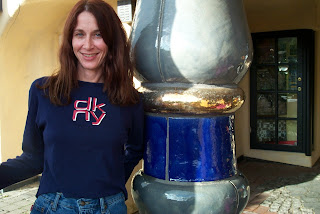It was a warm, sunny day that late August 2001, when, out of the blue, my then husband of two years announced that he didn't want to be married to me anymore. I never saw it coming. It's as if I was cold-cocked by a prize fighter. The force of the words knocked the wind out of me.
Worse yet was the timing of this brute-force sucker-punch. We were early into the three-hour-plus drive to my parents' house to pick up gifts we were to distribute to my relatives in Germany. Our three-week vacation to my mother's home land was months in the planning. The last time I saw some of my aunts, uncles and cousins was in 1974, when I flew alone at 13. In those days $350 bought you a round trip ticket from Colorado to Germany and back. In those days there were also designated smoking areas on airplanes.
In my kerfuffle I screamed and cried in spurts during much of that drive. I wanted answers. I didn't think things were that bad between us. With my heart so heavy, how would I feign the happiness I'd felt when I woke up that morning? How would I fake "happily married" for the weekend at my parents' house, much less the entire month of September in front of relatives I hadn't seen in so long? Could he not have waited until after the monumental vacation to make his announcement?
We flew into Düsseldorf, September 7, where, after a 13-hour flight we were greeted by one of my aunt's boyfriend. His English was as rusty as my German but we managed to eek out plans for the afternoon. We would have a late lunch, then take a mini-tour of Düsseldorf. Jet lag hit us so hard that we were back in our room, ready for sleep by 7 p.m. Our gracious host bid us adieu. He would pick us up for an early breakfast at the train station. He would keep the luggage we didn't need for our three-day trip to Amsterdam. On the return he'd meet us again at the train station with the rest of our luggage before continuing on to Stuttgart.
September 8-11 was to be our alone time, spent in one of the most intoxicating cities in Europe. By lunch, we disembarked at Amsterdam's Centraal Station. Feeling rested, we walked the mile or so to the Bridge Hotel, an out-of-the-way hotel overlooking one of the city's many canals. We would cover a lot of miles on foot over the next three days. Our marital woes seemed to vanish as we trekked through the phantasmagorical city. The old, droopy apartment buildings were a surreal backdrop for a city brimming with youthful energy. There was something almost comical about the way the buildings leaned against each other, like drunks holding each other up.
 |
| Leaning houses and house boats in Amsterdam. |
The wee morning hours of September 11 were busy with last minute packing, having our last Danish breakfast (yoghurt, fruit, granola, soft-boiled egg, juice and strong European coffee), snapping last minute photos and high-tailing it back to Centraal Station. Once on the train we would be able to relax and absorb the last three days. In a few hours we'd be back in Düsseldorf to collect the rest of our luggage. From there it would be another three or so hours to Stuttgart.
 |
| A moving-train shot of the cathedral in Köln. |
We arrived in Stuttgart a little after 5 p.m. Most of my aunts, uncles and cousins were there, eagerly awaiting their chance to hug us and tell us everything was going to be all right. At that point we had little reason to think otherwise. Everyone spoke at once. I thought it was because we hadn't seen each other for so long. That was only partly the reason.
One of my aunts spoke excitedly in broken English, describing planes crashing into buildings. I nodded, wondering why she was bringing up scenes from a movie. The direness of what she was trying to tell me was lost in translation. Then my cousin, who speaks very good English, said earnestly, "Yes, Kimmie. It's true. Did you not hear about it?"
"Hear about what?!"
She told me what they knew about the unfathomable story unfolding before the world. In one moment a few spoken words changed life as I knew it. Fear and nausea washed over me like a tidal wave as a deep sadness crept in and settled into my heart for the duration of the vacation. It got to all my relatives. One uncle was so distraught he canceled plans to take us to Munich's Oktoberfest, saying he wasn't in the mood to party. It hit me particularly hard because my husband was a firefighter.
 |
| One of many horrific images that will forever haunt us. |
 |
| A poster ad for a magazine in Strasbourg, France. |
 |
| Elementary school students in Freudenstadt, Germany, drew pictures for therapy. "Das Attentat" means "The Assassination". |
 |
| A tired smile at the Hundertwasser house in Plochingen, Germany. |

